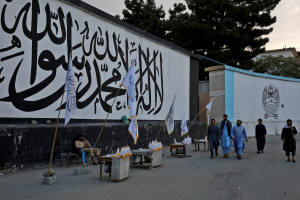A year of Taliban rule gives Afghanistan security but little hope
 Send a link to a friend
Send a link to a friend
 [August 15, 2022]
KABUL (Reuters) - The Taliban
marked a year in power on Monday with small-scale celebrations by the
group's fighters as Afghanistan struggles with rising poverty, drought,
malnutrition and fading hope among women that they will have a decisive
role in the country's future. [August 15, 2022]
KABUL (Reuters) - The Taliban
marked a year in power on Monday with small-scale celebrations by the
group's fighters as Afghanistan struggles with rising poverty, drought,
malnutrition and fading hope among women that they will have a decisive
role in the country's future.
Some people fired celebratory gunshots in the air in Kabul and Taliban
fighters gathered, waving the group's black and white flag to mark a
year since they marched into the capital after a stunning series of
battlefield victories.
"This day is the day of the victory of truth over falsehood and the day
of salvation and freedom of the Afghan nation," said Taliban
spokesperson Zabihullah Mujahid in a statement.
The country is safer than it was when the hardline Islamist movement was
fighting against U.S.-led foreign forces and their Afghan allies,
although a local offshoot of Islamic State has carried out several
attacks.
Yet that relative security cannot mask the scale of the challenge the
Taliban face in setting Afghanistan on a path of economic growth and
stability. There are huge pressures on the economy, caused in large part
by the country's isolation as foreign governments refuse to recognise
its rulers.

Development aid upon which the country relied so heavily has been cut as
the international community demands that the Taliban respect the rights
of Afghans, particularly girls and women whose access to work and
education has been curtailed.
The Taliban is demanding that $9 billion in central bank reserves held
overseas be returned, but talks with the United States face hurdles,
including the U.S. demands that a Taliban leader subject to sanctions
step down from his position as second in command at the bank.
The Taliban refuse to cede to these demands, saying that they respect
all Afghans' rights within the framework of their interpretation of
Islamic law.
And until there is a major shift in either side's position, there is no
immediate fix in sight for spiralling prices, rising joblessness and
hunger that would get worse as winter sets in.
"We are all heading to darkness and misfortune," said Amena Arezo, a
doctor from southeastern Ghazni province. "People have no future,
especially women."
OVER HALF IN POVERTY
Roughly 25 million Afghans are now living in poverty - well over half
the population and the United Nations estimates that up to 900,000 jobs
could be lost this year as the economy stalls.
[to top of second column]
|

An Afghan man sells Taliban flags next to the wall of the former
U.S. embassy in Kabul, Afghanistan, August 12, 2022. REUTERS/Ali
Khara

Fatima, who lives in Herat province in the west of the country, said
she had noticed improved security during the past year, but noted
with dismay that schools for girls had closed and there was a lack
of job opportunities for women.
Like many Afghans, she asked that only her first name be used for
fear of reprisal.
Jawed, from southern Helmand province, which saw heavy fighting in
the past, said security had improved dramatically since the Taliban
returned to power 20 years after they were ousted by U.S.-backed
forced, but also noted rampant inflation.
The last time the Taliban ruled Afghanistan in the late 1990s, women
could not work, girls were banned from school and strict Islamic law
was brutally enforced, including through public executions.
Civil society and independent media have also shrunk, with many of
its members leaving the country. The U.N.'s mission to Afghanistan
said in a recent review the group was limiting dissent by arresting
journalists, activists and protesters.
A Taliban spokesman had rejected the U.N.'s report and said
arbitrary arrests were not allowed.
The country's administration continues to be considered a caretaker
government or 'de facto' authority with acting ministers, whose
decisions can be overturned by the group's supreme spiritual leader,
based in the southern city of Kandahar.
Some constitutional and legal experts say that it is not always
clear how the legal and moral Islamic code of Sharia will be
interpreted and applied in practice.

"The most obvious problem is there is no uniformity of law," said
Zalmai Nishat, an Afghan constitutional expert who previously worked
as a government adviser.
"Now it's at the whims of the (Taliban) leader in Kandahar and also
at the whims of those who are leading on his behalf ... that's the
problem, it's the unpredictability."
(Reporting by Mohammad Yunus Yawar and Charlotte Greenfield; Editing
by Michael Collett-White and Raju Gopalakrishnan)
[© 2022 Thomson Reuters. All rights
reserved.]
This material may not be published,
broadcast, rewritten or redistributed.
Thompson Reuters is solely responsible for this content. |